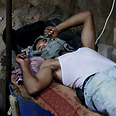
A Palestinian escapes the heat
צילום: AP
Gaza's poorest struggle to survive
Conditions in Gaza have worsened since 2007; Blockades enforced on Hamas' territory by Israel, Egypt
Salih Alwadiya is among Gaza Strip's poorest. The 61-year-old's home consists of a kitchen, several small rooms and a space devoted to cages full of pigeons and a goose. Many of his 20 children, from three wives, live with him near a sewage plant. In all, more than 50 people live in the small compound.
Their only form of transportation is a donkey cart, as his motorcycle is broken. With the house's roof made of scrap metal, his only escape from the stifling heat is to lie down in the dark room with the pigeons.
Related stories:
"When electricity cuts off, as happens every day, I go to the bed in front of the pigeon cage," Alwadiya says. "In the day, we suffer from flies and at night, we suffer from mosquitoes."
While Gaza has always been poor, conditions in the crowded seaside territory have worsened since Hamas militants seized power in 2007. Israel, which considers Hamas a terrorist group, along with Egypt imposed a blockade that greatly restricted imports and exports out of the area. Although the blockade has been eased, the economy remains stagnant.
Roughly 70 percent of Gaza's 1.7 million people rely on handouts, and per capital GDP, a measure of economic activity, is lower today than it was in 1994, according to the Palestinian Central Bureau of Statistics. Nearly half the population lives in dire poverty, defined by the UN as living on less than $2 a day.
Like many Gazans, Alwadiya, the family patriarch, used to work as a laborer in Israel. But Israel long ago stopped letting Gazans in for work. Alwadiya, who lost his right leg in a car accident as a child, was also wounded by shrapnel in an Israeli airstrike in 2008. He lost his job as a security guard seven months ago and remains unemployed.
The family earns a little by selling eggs. Most of their food and clothes come from donations. Alwadiya's wife Handoma, 54, suffers from high blood pressure, and Alwadiya fears the children will get sick from exposure to the sewage near the yard where they play.
"We are suffering from the smell of the garbage and the sewage daily," he says.
Alwadiya's daughter-in-law, Ibtisam, lives in a small bedroom with her husband and three young children. She says she pushes the children to study hard in hopes of a better life. "This is our priority," she says.
- Receive Ynetnews updates directly to your desktop










